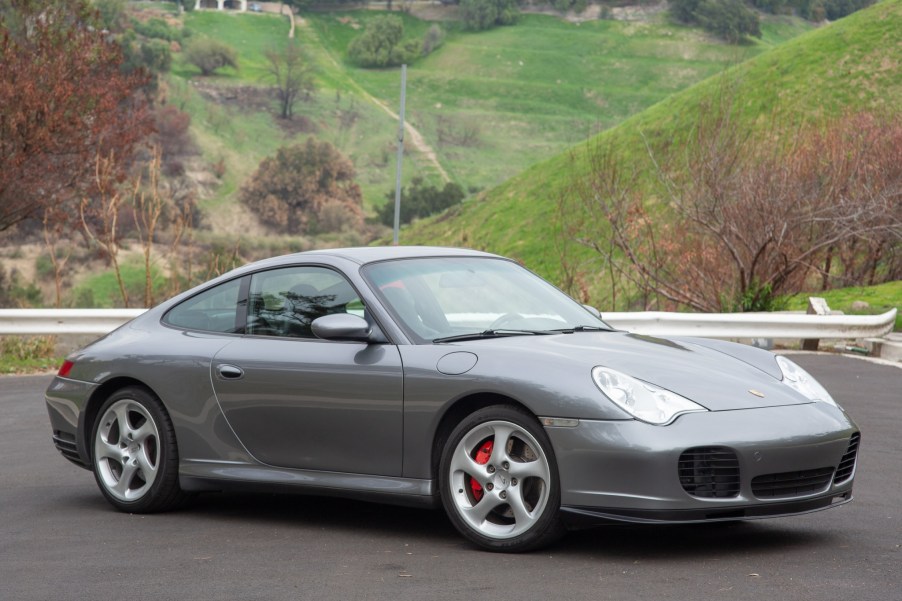
How the Porsche IMS Bearing Doomed the 996 911
Porsche’s current reputation has much to do with the iconic 911. It’s evolved from a simple sports car into something that can out-accelerate and out-handle some supercars. And classic 911s aren’t some delicate garage display, either. Singer restores them into over-engineered works of art, for one. And for another, it was the 911’s presence in rallying that paved the way for the current Safari 911 trend. But for all that, there is a dark spot in the Porsche 911’s history. It’s the 996 (1999-2004) 911, and the problem is the Porsche IMS bearing.
Porsche IMS bearing issue explained
When Porsche changed the 911 from air-cooled engines to water-cooled ones for the 996-generation, that required some significant engine redesigns.

One part of the new engine was Porsche’s intermediate shaft bearing. As Autohaus Hamilton explains, this bearing links the engine’s crankshaft with its camshafts via chains. This allows the crankshaft to run the camshafts without drastically shortening the chains’ lifespan. Car Throttle reports it also lets the crankshaft run the engine’s oil pump. Many engines have these shafts, even air-cooled 911s, RPM Specialist Cars reports. The part itself isn’t unusual.
However, as Jalopnik explained, the Porsche IMS bearing had a design flaw, which RPM Specialist Cars reports stems from the change to water-cooling. Although the IMS helped run the oil pump, there wasn’t actually a way for oil to lubricate it. Instead, it had to rely on its own internal grease. Over time, the grease would break down and wear away. And then it was only a matter of time before it’d fail.
And if it failed, and you didn’t catch it in time, you’d be buying a new engine for your 996 911. The Porsche IMS bearing issue is still a concern, to the point that the 996 is generally the cheapest 911 available.
Can this be repaired?
Luckily, there are ways to resolve the Porsche IMS bearing issue. Nowadays, there are several companies, such as LN Engineering, TuneRS Motorsports, IMS Engineering, and Pelican Parts, that provide stronger, longer-lasting versions of the IMS bearing. Jalopnik even reports that TuneRS Motorsports’ kit actually routes engine oil to the part, essentially making it immune to grease failure.
Because the IMS’ bearing design changed throughout the 996’s lifespan, a great resource for model-year-specific parts is IMSretrofit.com. The kit itself costs roughly $1000, and it can be a DIY repair. If a shop does it, Jalopnik claims it’ll be a roughly 2-3-day, $1000 job on top of the part cost.
But, repairing the Porsche IMS bearing is only possible if caught in time. Some early signs of IMS failure, like an oil leak from the engine’s rear, can be fairly subtle, according to RPM Specialist Cars.
However, one very clear indication of impending part failure is metal debris in the oil filter or oil itself, Pelican Parts explained. Although troubling to see, at this point the bearing hasn’t completely failed, and the engine is most likely still OK. You or a trained mechanic can also remove the IMS cover and see if it’s wobbly.

Also, an IMS bearing on its way out is going to make some noise. At first, it’ll be fairly subtle: some metallic knocking sounds, along with extra harshness and vibration. After that, there’ll be a rattling sound when you first start the 911, and possibly when you decelerate. However, at this point, the Porsche IMS bearing is on its last legs. If you don’t replace it now, it’ll soon fail, and you’ll be out thousands of dollars—and possibly an engine.
Does the Porsche IMS bearing only effect the 996 911?
Unfortunately, the Porsche IMS bearing issue doesn’t only affect the 996-gen 911. However, it also doesn’t affect every single 996 911.
When Carwow’s host Mat Watson was buying his own 996 911, the dealer he interviewed claimed only about 1% of all 996 911s suffer IMS bearing issues. Doug Demuro claims the number is more like 5%. Somewhat ironically, Pelican Parts reports that the ‘babied’ 996s actually tend to develop IMS bearing issues more frequently than the ones driven hard.
Furthermore, if you own a 996 Turbo, GT2, or GT3, Rennlist, and Pelican Parts forum users report you’re in the clear insofar as Porsche IMS bearing issues are concerned. These actually used the so-called ‘Mezger engine’, with a different design that eliminated the IMS flaw.
Switching to the Mezger engine—named for one of Porsche’s famed engineers, Hans Mezger—also solved the later 997’s IMS issues. The earlier (2005-2008) 997.1 cars, according to Revolution Porsche Specialists, still had IMS bearing issues. The company also claims 2000-2005 Porsche 911s are the models most frequently subject to IMS bearing failures. However, the 2009 997.2 Porsche 911 introduced a new engine design that did away with the problematic IMS bearing. So, any 2009 MY or later Porsche 911 is immune to IMS bearing failure.

Fortunately, although the IMS issue has affected resale values, it didn’t significantly blunt Porsche 911 sales. As long as you keep it in mind, a 996 or 997.1 911 can be a remarkably affordable way into Porsche ownership.
Follow more updates from MotorBiscuit on our Facebook page.


